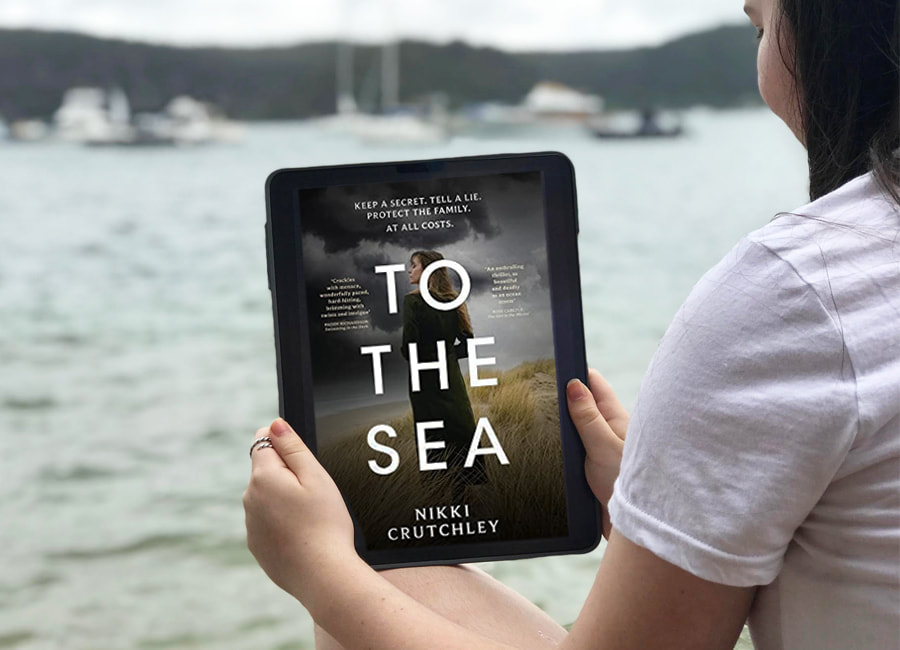|
Published by HarperCollins Australia December 2021 | Crime fiction, Thriller A gruesome crime committed on a beach hemmed in by towering cliffs on a wild, remote stretch of New Zealand’s coast, marks the opening of Nikki Crutchley’s fourth crime novel, To The Sea.
And it’s this same idyllic beach, some 23 years later, that’s part of a secluded coastal property, Iluka, which has always been home to 18-year-old Ana and her family – and also the menacing setting for the entire story as it unfolds. Crutchley’s evocative descriptions of Iluka – a fictionalised version of the beaches along the Coromandel Coast of New Zealand’s North Island – are immersive. The landscape becomes an additional character, in equal measures breathtaking and threatening – hallmarks that have become so synonymous with the growing corpus of great Kiwi noir fiction. Padlocked off from strangers and screened by giant pines running the length of the land, Ana's family’s house sits atop the cliffs, ravaged by its proximity to the expansive sea below. With nothing to compare her life to, Ana finds little to fault with the hard graft, strict rules and barbarous punishments dished out by her grandfather, Hurley – and endorsed by her mother Anahita. That’s because she was told it was to “protect” her – and her family’s home, Iluka – from the outside world. I never fought. There was no point. Anahita was stronger than me and rules were rules. This was the way it had always been. Ana’s narration of present day life at Iluka begins to alternate in a dual timeline with the historic perspective of her mother Anahita from almost a quarter century earlier when Hurley uprooted Anahita, her brother Dylan and mother from their urban life to start afresh at the isolated property. The two women’s narratives weave together, gradually painting a troubling portrait of a family bound together by a web of dark secrets and lies, underpinned by insidious domestic abuse perpetrated by Hurley. He’d moved them to Iluka ostensibly compelled by an obsession with the sea, sparked when he was badly injured as he was washed to shore after a boating incident during a wild storm. The sea spared his life, prompting his apparent conversion into oceanic zealot, wanting to “exist as one” with earth and ocean at Iluka. He’d cut off his family from the world under the guise of protecting their new subsistence lifestyle, but it also unbridled his megalomania. The novel’s title is a nod to Hurley’s ominous words: “To the sea,” he would say, at times as a tribute, at others an order, foreshadowing his intention to punish, “for all she gives, and all she takes away.” Ana’s naïve acceptance of her family’s claustrophobic lifestyle begins to fray when strangers prompt her to question the past, threatening to upend everything she’s known. As she unearths clues about the horrific crime in the opening chapter, she finds herself in a precarious position, with the power to protect or destroy her beloved Iluka. The underlying tension then rumbles all the way to the finish. There is much to admire in Crutchly’s newest novel, the fourth since her 2018 debut Nothing Bad Happens Here, which was shortlisted for the Ngaio Marsh Awards, New Zealand's annual literary prize for excellence in crime fiction, mystery and thriller writing. Her second, No One Can Hear You, was on the Award’s longlist in 2019. Besides her broody depiction of the landscape, in To the Sea Crutchley provides discomfiting insights into domestic violence – the pervasive power of mental manipulation and physical harm – and explores how abusive control can be normalised through generations. Her pacing and ability to boil tension throughout the novel is also skilful – I often felt I’d guessed the twists, but was gratified to find I was wrong. But I also felt there were weaknesses. At times I needed to suspend my disbelief, to ignore the sense that characters and events had been implausibly jammed in to suit the plot. For example, Hurley, who was so dogmatically determined to shut Iluka off from the world, seemed a little too easily convinced to allow visiting creatives onto the property for paid short term stays. It seemed a bit too out of whack with his tyrannical character, although a convenient device to facilitate Ana’s meetings with strangers. I also wished for more development in the crucial relationship between Ana and the stranger who prompts her dark discoveries – again, this lacked a bit of plausibility for such a critical plot point, particularly given it would have been the first ever relationship Ana had formed with anyone outside her immediate family. But these minor flaws don't detract from Crutchley's captivating storyline, along with its masterful uncomfortable tension and atmosphere; and grisliness that's not easy to forget. Comments are closed.
|
Categories
All
Archives
May 2024
|

